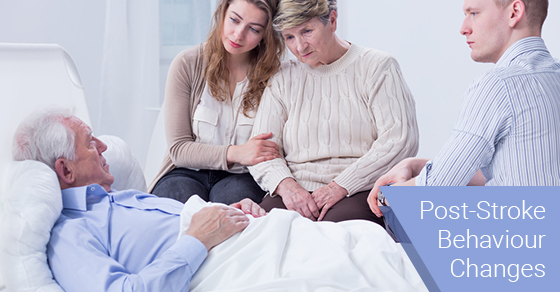A stroke affects a person in a variety of ways — not only physically, but also emotionally. The emotional effects of a stroke can then go on to change a person’s behaviour. Emotional changes occur because the stroke has injured the brain, which controls both emotions and behaviour. This is often very difficult for families, especially familial caretakers, to deal with. If you or your loved one has experienced a stroke, here are some behavioural changes that can occur. It may make you feel better to know that behaviour changes can improve over time.

- Sadness, Low Mood, Loss Of Interest, Inability To Manage Life
Sadness, a low mood, a loss of interest in things that once interested them, as well as an inability to manage their lives are both emotional and behavioural changes that can occur after a stroke. They are all symptoms of depression, which is the most common emotional change that can occur after a stroke. Typically this occurs because the person has suffered a loss of independence in the process, but there are other factors at play, too.
- Restlessness, “On Edge,” Tired
These are three additional behavioural changes that can occur after a stroke. Typically, it is caused by a sense of anxiety. Not only does anxiety change behaviour, but it can also change a person emotionally, causing them to be more nervous or stressed for a period of at least six months.
- Personality Changes
Personality changes can affect behaviour in a variety of ways and are very typical after a stroke. They can include anger or irritability, which may affect one’s behaviour by causing them to lash out at others when they normally wouldn’t. Some people may be unable to control their emotions, which means they could break out into tears or laughter without being able to control it. Aggression can also occur after a stroke and may result in violent and verbal behaviour changes, such as hitting, biting or verbal insults. Impulsivity may cause people to do things without thinking or engage in unsafe behaviour.
- Neglect: An Attentional Disorder
Neglect is an attentional disorder that results in a person ignoring one side of his or her body. Keep in mind that this disorder usually only affects those who have had a right-hemisphere stroke, causing them to ignore things on the left side. This could mean that they might not recognize their arm or leg or they might ignore the food on the left side of their plate. This disorder can be improved by encouraging the stroke survivor to pay attention to the left side in an encouraging way.
- Cognitive Challenges
A stroke can cause various cognitive challenges. This might include memory problems or difficulties solving problems, as well as difficulties with being able to communicate.
C-Care Health Services offers a variety of affordable, personalized and high quality services. Contact us today to learn more.

